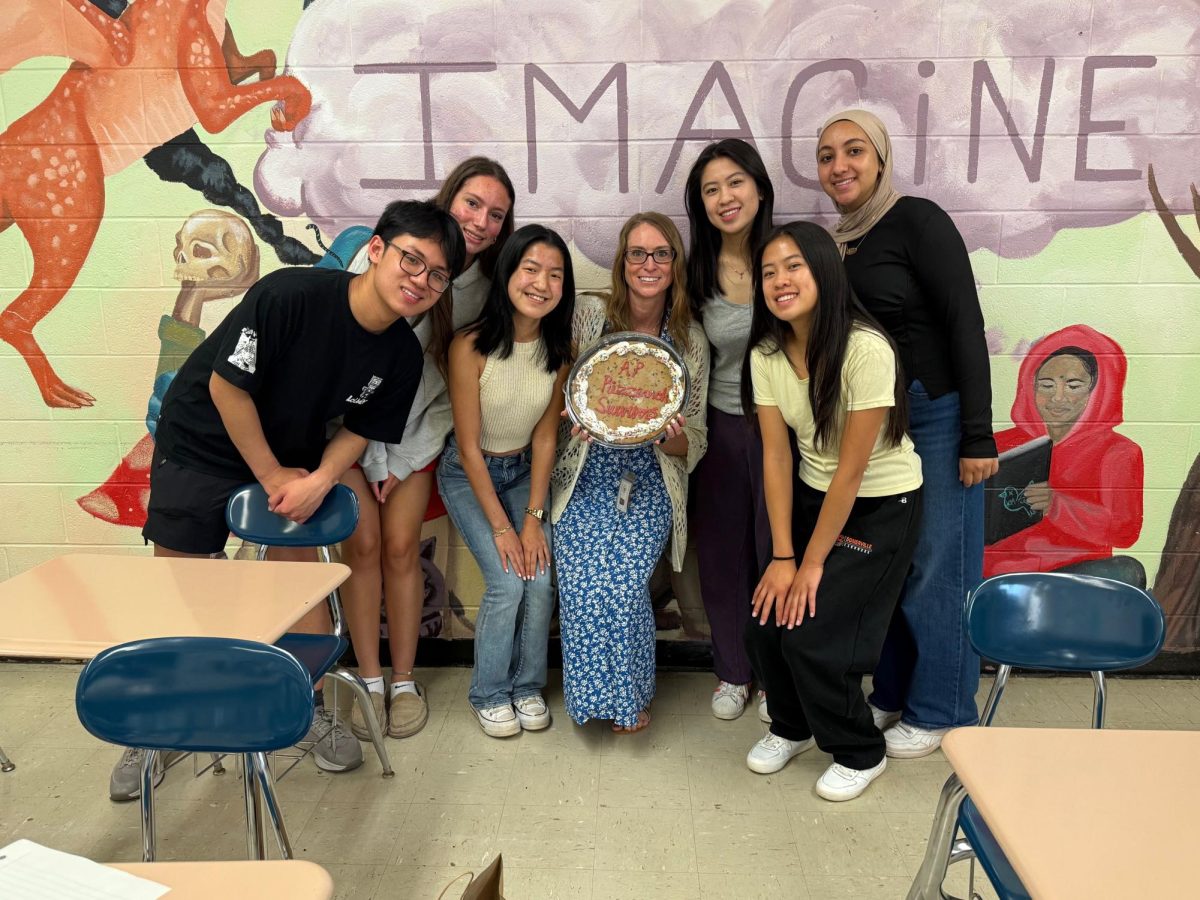
Ms. Matulonis and her students!
Many students at SHS still don’t know about the AP Capstone program—a two-year sequence that culminates with an AP Research project students work on for an entire year. They submit and present this project to the College Board in order to receive college credit and, potentially, the prestigious AP Capstone Diploma. This year, students completed an especially interesting variety of projects that conveyed their interests and passion.

We are especially proud of Achyut Mani, whose paper will be published in the Journal of Research High School (JRHS) later this summer, who conducted a study analyzing the relationship between personality and learning success in fencing. Mani examined the correlation between learning outcomes and personality traits such as neuroticism, stability, introversion, and extroversion. When asked about his experience, he explained, “AP Research helped me understand how to approach larger projects and long-term goals. It taught me how to communicate more effectively, especially as I developed my networking and public speaking skills. I learned that when you commit to something over an extended period of time, amazing things can happen. This was especially true for this project.”
Ethan Shaw, another sports enthusiast, conducted a study investigating how swimmers’ preference for a specific stroke affects their anxiety, confidence, and performance. He used surveys to assess participants’ stroke preferences, anxiety levels, and confidence, and conducted an experiment to measure their performance. What Ethan appreciated most about AP Research was how it taught him to be more independent, as he was responsible for making the major decisions in his study. He also enjoyed the small class size, which allowed him to build stronger connections with his classmates than in other classes.

Senior Hailey Rolon conducted a study analyzing the correlation between parental involvement, birth order, and academic achievement in high school students. She utilized a survey to explore how each factor related to one another. Hailey described her experience: “In AP Research, I loved collaborating with other people and learning about one very in-depth topic. During my time in this class, I learned how to manage my time in a precise manner and synthesize sources. If I could take this class again, I would—it’s amazing!”
Tiana Nguyen, who conducted a study about how different music genres affect emotions and motivation in high school fencers, explained, “AP Research was a fun class that taught me more than just writing skills. Along the way, I picked up life skills like time management and critical thinking. Also, Ms. Mat is a great teacher, so take AP Research!”
Grace Norgalis and Sumayyah Salama are two passionate seniors who utilized the content analysis method for their projects. Grace analyzed how gender roles, diversity, and family dynamics are portrayed in the popular children’s shows Sofia the First and Elena of Avalor. She explored how these themes evolved over time, particularly by comparing the earlier Sofia episodes to the later-released Elena. Grace described AP Research as one of her favorite classes in high school because it gave her the freedom to explore a topic she was genuinely passionate about—an opportunity rarely offered in traditional courses. It also pushed her to grow in areas she hadn’t previously focused on, like public speaking, independent decision-making, and long-term project management.
Finally, Sumayyah’s project was truly powerful. For her content analysis, she examined biases in news headlines regarding the murder of five-year-old Palestinian girl Hind Rajab, focusing on how wording differed between Western and Eastern news outlets and how this perpetuated stigmas and biases. Salama explained, “AP Research was one of my favorite classes I’ve taken in high school because it allowed me to dive deeper into a topic that I am very passionate about. I also learned time management and the importance of using your voice to make an impact on others.”
